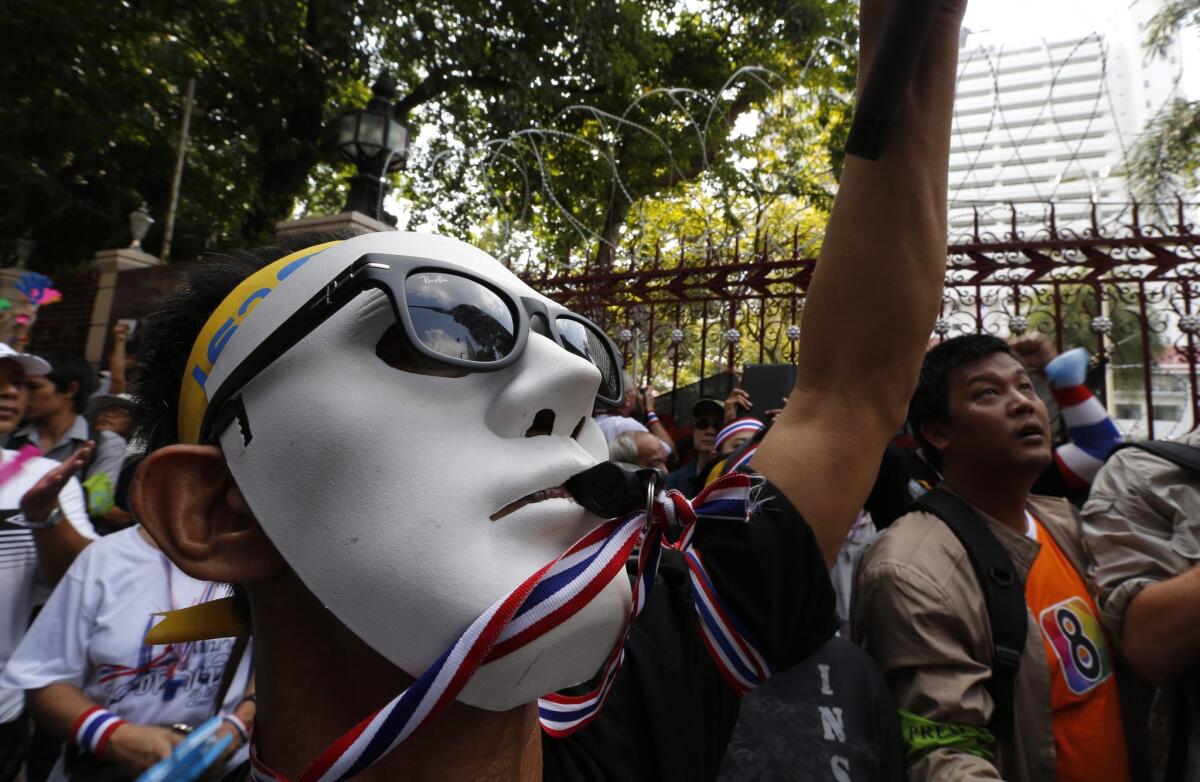Thailand unrest grows as protesters attempt ‘people’s coup’

BANGKOK, Thailand – Riot police fired tear gas Sunday at anti-government protesters armed with petrol bombs trying to force their way into the prime minister’s complex and police headquarters, intensifying Thailand’s political crisis and raising fears of extended instability in the Southeast Asian nation.
For most of the last week, protests remained peaceful. But on Saturday, the seventh day of protests, clashes between pro- and anti-government supporters turned violent around Ramkhamhaeng University, with at least three people killed overnight and dozens injured, according to police. Witnesses reported more shots Sunday near the university and an adjoining stadium that’s been a base for government supporters.
“We can’t take any more of this corrupt government,” said Adi Ngo, a fifthysomething protester, as demonstrators nearby tried to breach concrete barriers and razor-wire-lined police barriers around Thailand’s seat of government. “This government doesn’t obey the law.”
Anti-government leaders declared Sunday “victory day” in what they’ve termed a “people’s coup,” urging their supporters to take over 10 government offices, six television stations, police headquarters and the prime minister’s offices in a bid to undermine the government.
The protest movement, which fell well short of its Sunday “coup” objective, wants to overthrow the administration of Prime Minister Yingluck Shinawatra, whom they accuse of being a puppet for her older brother, Thaksin Shinawatra. Thaksin remains in self-imposed exile after his 2008 conviction on corruption charges.
Sunday was the first day the police used significant force against demonstrators. “The use of tear gas is part of our procedures,” said Piya Utayo, a national police spokesman, on television.
Protesters descended on at least three television networks calling on them to broadcast their views and not those of the government. A government-run station, Thai Public Broadcasting Service, continued with its regular programming even as it attempted to negotiate with protesters.
Continued unrest has led foreign governments to issue travel advisories. Bangkok airports have also advised passengers to allow extra time when catching flights given protracted traffic jams. And several of Bangkok’s largest and poshest shopping centers were forced to close.
The prime minister also reportedly fled a police compound and postponed a planned press conference when several dozen protesters attempted to get into her heavily guarded offices. Yingluck’s whereabouts were not immediately known.
As she retreated from sight, her critics suggested this showed how weak she was. “The fact that Yingluck is nowhere to be seen is proof that she is now a lame duck Prime Minister,” anti-government protesters said in a tweet.
The day saw cat-and-mouse skirmishes between protesters and police in different parts of the city. At one such face-off near the ornate Marble Temple, police let off volleys of tear gas at demonstrators who had commandeered a police truck and were driving it provocatively in front of police lines. As tension mounted, protesters jeered at the police, calling them “lizards” and “buffalo,” with police responding in kind.
Elsewhere, in front of police headquarters, demonstrators lambasted officers for their ties to Thaksin, a former policeman. Outside, someone had replaced the “royal” in the “Royal Thai Police Headquarters” plaque with “Thaksin,” suggesting the former prime minister and his sister weren’t fully loyal to the Thai King, a long-ruling figure whose 86th birthday falls on Thursday.
As darkness fell, several government ministers advised Thais to stay off Bangkok streets until dawn to avoid trouble.
The crisis erupted when Yingluck’s government submitted a bill to parliament that would have granted amnesty to Thaksin, a telecommunications tycoon and former premier who was ousted in a coup in 2006, paving the way for him to return to Thailand and potentially run for office.
Although the measure was defeated in the Senate, it shattered an uneasy political calm in place since Yingluck was elected in 2011 between less-educated or prosperous rural voters and more urban Thais more closely associated with the monarchy and the army.
This political crisis is the worst since 2010 when Thaksin supporters inhabited parts of the capital for two months before being routed in a government crackdown. The two-month standoff killed 91 people and wounded hundreds.
The increase in violence in recent days has led some to wonder whether Thailand could see a division between the police, seen as broadly aligned with Thaksin and Yingluck, and the army, generally viewed as more sympathetic to anti-government protesters.
But Thitinan Pongsudhirak, director of the Institute of Security and International Studies at Bangkok’s Chulalongkorn University, said fears of a breach between the military and the Thai government or police are overblown.
“The army has been calling for calm and asking the protesters to go home,” Thitinan said. “If the army wanted to side with the protesters, they would have done something by now.”
Special correspondent Roughneen reported from Bangkok and staff writer Magnier reported from New Delhi.
ALSO:
At least one dead in Thailand protests
Egypt panel votes on constitutional reforms
Death toll rises in crash of police helicopter into Glasgow bar
More to Read
Sign up for Essential California
The most important California stories and recommendations in your inbox every morning.
You may occasionally receive promotional content from the Los Angeles Times.










